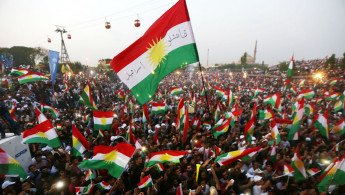Kirkuk a tense flash point ahead of Iraqi-Kurdish referendum
Kirkuk, populated by Kurds, Arabs, Turkmen, and Christians is one of 15 ethnically mixed areas in northern Iraq that will participate in the upcoming Kurdish referendum for independence on 25 September.
Kurdish forces took over the city of Kirkuk in 2014, when the Iraqi army fled fighting during the Islamic State's offensive in northern Iraq.
The Kurdistan region produces around 600,000 barrels per day of oil, with the Kirkuk province alone producing around one quarter of the region's oil.
If the region does break away from Baghdad then Kirkuk would fall along the border between the two, with control over the area bitterly contested by Kurdish and Iraqi forces.
Statistics on Kirkuk's population are unreliable, with both Kurds and Arabs saying they have a demographic majority, a vital claim to legitimise control over the province.
'Rising tensions'
Tensions in Kirkuk have risen in recent weeks as the rhetoric between the Kurdish leadership and Iraq's central government escalates, with Baghdad voting to reject the referendum and oust Kirkuk's governor Najmaldin Karim from office.
At least one Kurd has already been killed in pre-referendum clashes as a Kurdish convoy celebrating the vote was shot at on Monday, with security checkpoints erected across the city to prevent further violence.
Since the referendum announcement, both Western and regional powers have expressed opposition to the vote, but Iraqi Kurdish officials have insisted the referendum will go ahead as planned.
Kurds have been marking out their territory in the run-up to the historic vote, with Peshmerga outposts protecting oil fields on Kirkuk's outskirts while Kurdish flags adorn buildings across the city.
In July, a statue of a Kurdish Peshmerga fighter with a gun slung over his shoulder was erected at the entrance to Kirkuk, a symbol of the desire of Kurds to cement their hold over the contested city.
"Kurdistan's land belongs to the Kurdish people," Kemal al-Kirkuki, the Kurdish military commander responsible for the front-line against Islamic State group, told Reuters at his base in Dibis.
"No one, not the PMU [Hashd al-Shaabi], has the right to take it ... We will ask them to leave Kurdish territory, peacefully. But we are prepared to fight if we need to."
Many non-Kurds in the region also fear Baghdad will attempt to regain control of Kirkuk after the referendum and send in the Shia Hashd al-Shaabi militias, who are stationed just outside the province.
 |
During Saddam Hussein's Anfal campaign against the Kurds in the 1980s there was forced 'Arabisation' of disputed areas, which displaced Kurds from the Kirkuk province |  |
"I fear the Hashd will come and fighting will start in Kirkuk," Nazim Mohammed, an Arab from Mosul who fled to Kirkuk when the northern city was overrun by Islamic State, told Reuters.
The Iranian-backed militias fear that independence for Kurdistan would split Iraq and weaken their, and Iran's, influence.
Iraq's Prime Minister, Haider al-Abadi, had earlier warned that the Iraqi military would be willing to intervene in the Kurdish independence referendum if fighting broke out.
Demographic battle
During former Iraqi Dictator Saddam Hussein's Anfal campaign against the Kurds in the 1980s there was forced "Arabisation" of disputed areas, which displaced Kurds from the Kirkuk province.
Arabs from other areas of Iraq were then settled there, taking over Kurdish businesses and homes.
The campaign culminated in the notorious chemical attack on the Kurdish city of Halabja, which killed up to 5,000 people.
Many Arabs have since been ousted since Saddam was toppled by a US military invasion in 2003, while displaced Kurds were provided with incentives to return, angering other minorities.
"Since 2003 some 600,000 Kurds have arrived, many of them are here illegally," Ali Mehdi Sadiq, a Turkman member of Kirkuk's local council, told Reuters.
"Without dialogue everything is possible. We need to avoid a war engulfing the whole of Iraq."
The Turkmen councillor said he blamed Kirkuk's governor for what he called discrimination against minorities.
Najmaldin Karim has said he would guarantee minority rights, pointing to the stability of Kurdistan compared to Baghdad, but his actions worry minorities.
The governor has said he would burn his Iraqi passport the minute he got a Kurdish one, and has refused to sit behind an Iraqi flag in interviews, preferring a Kurdish one.
Karim said that when taking a big step like the referendum, "anything was possible", shrugging off the decision by Baghdad to fire him.
"Nothing comes without a price," he said.




